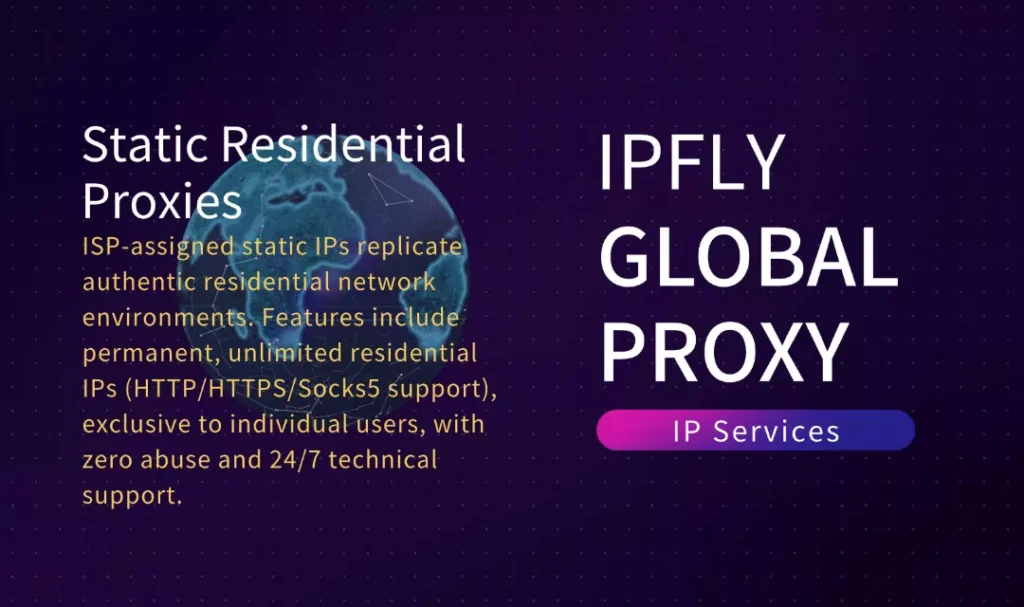The internet runs on IP addresses—unique identifiers assigned to each device connected to a network. While most internet users rely on dynamic IP addresses that change periodically, there’s another option: static IP addresses. Unlike dynamic IPs, a static IP remains constant, offering certain advantages for businesses, developers, and anyone requiring stable, predictable network access.
In this article, we’ll break down what static IPs are, how they work, their benefits and drawbacks, and when using one makes sense. We’ll also explore how proxy providers can deliver static IP solutions that combine stability with security.

What Is a Static IP?
A static IP address is an Internet Protocol address that does not change over time. Once assigned, it remains the same until it is manually modified. This contrasts with dynamic IPs, which are allocated by a DHCP (Dynamic Host Configuration Protocol) server and may change every time you connect to the internet or restart your router.
ISPs can assign static IPs to customers upon request. While these addresses cost more, they offer consistent accessibility, making them valuable for hosting services, remote connections, and certain security applications.
How Static IPs Work
Static IPs are configured manually on a device or router rather than automatically through DHCP. This means:
- The address stays the same no matter how often the device reconnects.
- External systems can always locate the device using the same IP.
- Configuration for services like DNS can be fine-tuned for reliability.
Because they don’t change, static IPs are often used in scenarios where precise addressing is essential, such as servers, networked printers, and surveillance systems.
Advantages of Using a Static IP
1. Reliable Remote Access
If you need to connect to your home or office computer from another location, a static IP eliminates the need to constantly track your address. This is crucial for IT administrators, remote workers, and businesses providing technical support.
2. Ideal for Hosting
Websites, FTP servers, email servers, and application hosting all benefit from a consistent IP address. With a static IP, DNS records don’t need to be updated when the address changes, reducing downtime and ensuring a smooth user experience.
3. Better for Email Deliverability
Dynamic IPs often share addresses with many users, some of whom may have sent spam, leading to IP blacklisting. Static IPs allow you to maintain a clean reputation, improving email deliverability.
4. Stability for Gaming and VoIP
Static IPs can help reduce latency and avoid sudden disconnections in online games or VoIP calls. This is especially important for competitive gaming or mission-critical voice communications.
5. Simplified Network Management
In a business setting, static IPs make it easier to configure firewalls, access control lists, and VPNs. Devices can be identified and authorized by their fixed addresses.
Drawbacks of Static IPs
While static IPs have clear benefits, they also come with trade-offs:
- Higher Cost: ISPs charge extra for static IP allocation.
- Reduced Privacy: Because your IP never changes, your online activity is easier to track.
- Security Risks: Hackers can repeatedly target a static IP, so strong security measures are critical.
When to Use a Static IP
You should consider a static IP if you:
- Host a website or business server
- Provide remote access for employees or clients
- Need stable VPN connections
- Run services like security cameras or IoT devices that require consistent access
If you only browse, stream, and game casually, a dynamic IP may be sufficient.
IPFLY and Static IP Services

While ISPs offer static IPs, they often come with limited flexibility and high fees. Providers like IPFLY offer a more versatile approach, supplying static IP solutions via secure proxies in multiple global locations. This setup lets you enjoy the advantages of a static IP while masking your real address for privacy and security.
IPFLY’s static IP services are ideal for:
- Businesses hosting global applications
- Researchers conducting location-specific testing
- Users needing consistent access to region-restricted services
You can also follow their Telegram channel for updates, promotions, and tech guidance.
Security Best Practices for Static IPs
If you decide to use a static IP, consider these measures:
- Use a firewall to block unauthorized traffic
- Enable strong encryption for remote access tools
- Regularly monitor network logs for suspicious activity
- Work with a reputable provider like IPFLY to manage secure routing
Conclusion

A static IP can transform the reliability and performance of your networked activities, from hosting to remote work. The key is to balance the benefits of a constant address with robust security and privacy measures. With solutions like IPFLY’s, you can enjoy the stability of a static IP along with the protection of advanced proxy technology.


